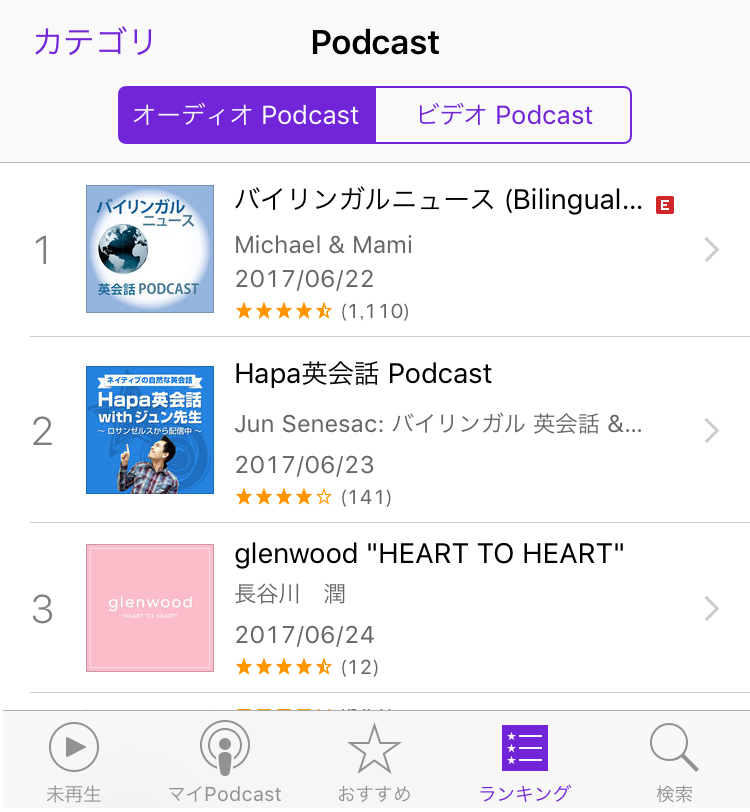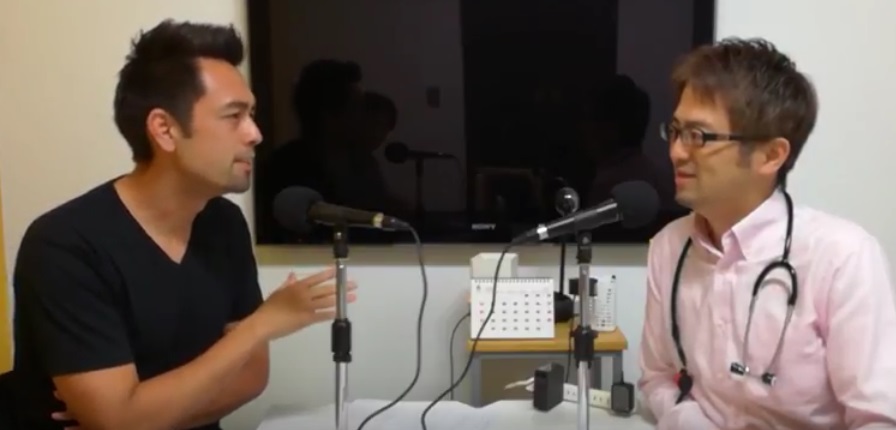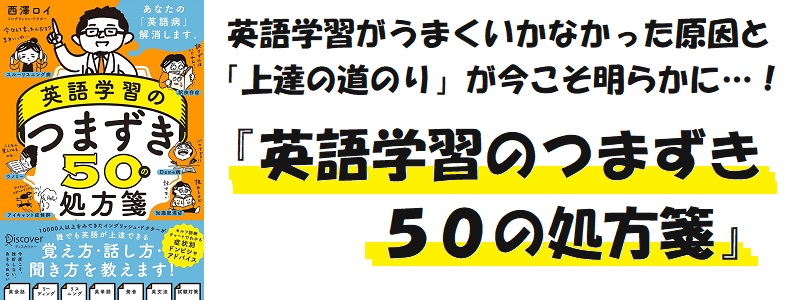こんにちは、イングリッシュ・ドクターの西澤 ロイです。
6月のラジオ「頑張らない英語」のゲストは、
Hapa英会話のセニサック淳(Jun Senesac)先生でした。
Hapa英会話といえば、PodCastのチャンネルとしては
日本でベスト3に入る大人気!

YouTubeチャンネルにも10万人以上の購読者がいます。
セニサック淳先生は、日本とアメリカのハーフ。
一体、どんな人生を送ってきて、そして今どのように
英語を教えているのかについて、(基本的に英語で)
インタビューをさせていただきました。
非常に興味深いお話が聞けました。
約15分間のインタビューはこちらです。
(英語字幕あり)
インタビューの文字起こし
Good morning.
(おはようございます)
Hey, how are you doing?
Thanks for having me today.
(おはようございます。
今日はお招きいただき、ありがとうございます。)
Yeah, thanks a lot for coming.
Would you introduce yourself?
(来てくださり、ありがとうございます。
自己紹介をお願いします)
Of course, of course.
Thank you for the introduction. Very kind introduction there.
My name is Jun Senesac and I currently run an English school in Orange County.
Orange County is an area that’s about twenty minutes away from Los Angeles.
And I primarily teach English to Japanese students.
(もちろんです。親切なご紹介をありがとうございます
名前はセニサック淳で、現在オレンジカウンティで英語学校を経営しています
オレンジカウンティというのは、ロサンゼルスから約20分くらいのところで、
日本人の生徒さんに英語を教えています)
So the Japanese people are like businessmen?
(ビジネスマンの方ですか?)
Yes, we primarily focus on Japanese businessmen who work at, for example,
Toyota, Mazda, Honda, Mitsubishi…
(主に日本人ビジネスマンを対象にしています。
例えば、トヨタ、マツダ、ホンダ、三菱…)
Wow, famous companies.
(有名なところばかりですね)
Big companies, yeah.
What we try to do is provide them with real life English conversation
so they could keep up with their coworkers and communicate with them.
(はい、本当に大企業です。
我々がやろうとしているのは、彼らが同僚とのコミュニケーションに
ついていけるように、本物の英語コミュニケーション教育を提供することです)
So, Hapa Eikaiwa. “Hapa” means “half”, right?
(Hapa英会話の”Hapa”は「ハーフ」という意味ですよね?)
That’s correct. Yes.
(はい、その通りです)
So, what kind of background do you have?
(淳さんはどのようなバックグラウンドをお持ちですか?)
It’s obvious, um, I’m half, I’m hapa,
which means that my mother is Japanese and my father is American.
And my mother moved to the United States roughly about 30, 35 years ago
and there they got married in the United States.
So I grew up in Los Angeles. That’s my hometown right there.
And I basically grew up learning both English and Japanese.
(ご覧の通り、ハーフです。
母親が日本人で、父親がアメリカ人。
母は30数年前にアメリカに移り、結婚しました。
だから私はロサンゼルスで育ったのです。
そして基本的に、英語と日本語を身につけながら育ちました。)
And I think, you know, a lot of people have the image that
if you have bilingual language environment, it’s easy to pick up two languages.
(多くの人が持っているイメージとして、バイリンガルの言語環境があれば、
2つの言語を身につけることは簡単だと思っていますよね。)
You know what? It’s really easy.
Just joking.
(はい、とっても簡単でした・・・というのは冗談ですw)
It’s actually not as easy as you think it is.
When you grow up learning two languages, you obviously have something to gain,
but you also lose something at the same time.
And that is what I personally experienced.
It’s because I grew up learning both languages.
I never really had a point in time where I mastered one language.
(実際のところ、多くの人が思うほど簡単ではありませんでした。
2つの言語を学ぶということは、もちろん得るものもありますが、
同時に失うものもあるのです。
私自身、それを体験しました。
1つの言語をマスターしたと思えたことは一度もないのです。)
I attended a private Japanese school in Los Angeles
from kindergarten up to fourth grade.
And in fourth grade I actually couldn’t speak any English
because I attended a full time private Japanese school.
(幼稚園から小学4年生までの間、ロサンゼルスにある
私立の日本人学校に通いました。
フルタイムの日本語学校でしたので、4年生の時には
英語が全然しゃべれなかったのです)
You lived in Los Angeles.
(ロサンゼルスに住んでいたんですよね?)
And that’s the weird part, right?
And my father is also American and it wasn’t that I couldn’t speak any English.
But I had a really difficult time communicating with my father,
so I had my mother come in as, like an interpreter.
(変ですよねw
私は全く英語がしゃべれなかったわけではありませんが、
アメリカ人の父とのコミュニケーションには非常に苦労しました。
母に通訳をしてもらっていたのです。)
In-house interpreter.
(家庭内通訳ですか…)
Yes, exactly!
And that was the really hard part
because there were a lot of things I wanted to say to my father but I couldn’t.
And there was that Japanese identity that I carried up until about point,
and I even thought that I was full Japanese up until fourth grade.
But then of course at… when I turned, I think, like 10, 11 years old…
during my fifth grade year my parents decided to put me through an American school.
A local elementary school.
And from there on I went from being a Japanese person
to now finding my American identity.
(まさにそうです!
父に伝えたいことがたくさんあったのに、それができなかったのは
非常につらかったです。
当時は日本人としてのアイデンティティがあり、4年生までは
自分のことを純日本人だと思っていたほどです。
でも10歳か11歳になった時、両親は私を小学5年生からアメリカンスクールに入れる
という決断をしました。
それから、日本人だった私はアメリカ人としてのアイデンティティを
見つけていきました)
And then I started losing my Japanese and I started becoming fluent in English.
And it’s this balance or imbalance, whatever you wanna call it,
that I had to kind of go through all the way up until really right now.
And in terms of, you know, which one is my mother tongue,
it’s very hard to say because I grew up learning both languages.
I feel very comfortable speaking both languages but…
Which one do I feel more comfortable speaking? Obviously it’s English.
And till this day if I don’t continue to study,
especially Japanese, very easy to forget.
(それから日本語を忘れてゆき、英語が流暢になりました。
2つの言語のバランスが・・・均衡と言うより不均衡なのかもしれませんが、
私が今までずっと経験してきたことです。
どちらが私の母語かというと、よく分かりません。
両方とも普通に話すことができますが、どちらがより快適かと言えば
明らかに英語ですね。
もし勉強を続けないと、特に日本語は忘れてしまいやすいのです)
Very interesting.
And that kind of experience influence the way you teach English, right?
(非常に興味深いです。
そういった経験が、英語の教え方にも影響をしているはずですよね?)
Huge huge influence you know.
Now that I look back, in retrospect, being in an environment
where I am constantly adjusting to the rest of the crowd…
so when I went into Japanese school, I was seen as a “gaijin”.
When I went in to my American school, I was seen as a “gaijin”.
So, I never had a place where I felt like I was part of the group.
So I had to do my best to try to fit into the crowd.
It was a difficult adjustment for me.
(非常に大きな影響を与えています。
振り返ってみると、私はずっと他のみんなに合わせなければいけない
ような環境にいました。
日本人学校では外人に見られ、アメリカンスクールでも外人に見られたのです。
だから私は、集団にうまく馴染んでいたという経験がありません。
「認められたい」という気持ちが強く、集団に入れるようにいつも頑張ってきたのです)
So how that influenced me was as I became older I realized that
it’s very important to understand there are many people from many different backgrounds,
going through many different things that you don’t know about.
And it’s very important to understand who they are.
And don’t make any judgments.
(それが私にどう影響したかと言うと、年齢を重ねるうちに気づきました。
いろんなバックグラウンドの人たちがいて、自分が知らないような違った経験を
してきているんです。
人をありのままに受け入れ、理解しようとすることが大切です。
勝手に決めつけないということ。)
And in terms of teaching, I learned that it’s important to make other people feel important.
And when students come in and they have a hard time speaking English
and when you go to a foreign country and you have a hard time communicating,
sometimes you feel like you are the less important person.
You kind of get shoved to the side.
But the moment you feel important and you can give that confidence to the students,
all of a sudden you start becoming more confident, you start like wanting to speak more English.
So those are just kind of the things that I decided to kind of…
My foundation right there is to not to judge anybody,
have an open mind, and just be adaptable,
to be adaptable to any kind of situation that I’m put in.
(教えることに関して言うと、相手に自己重要感を与えることが大切ですね。
ロサンゼルスに来て、英語がなかなか話せなかったり、
外国に行ってコミュニケーションがなかなか取れなかったりすると、
自分がちっぽけに思えてくるものです。
端っこに追いやられてしまう、というか。
でも、自己重要感を持つことができると、
急に自信が芽生えてきたり、もっと英語を話したくなったり・・・
私はそういうことを・・・
私の土台は、人を勝手に決めつけないで、オープンマインドで、フレキシブルで、
どんな状況に置かれても、そこに対応していくことです)
Well, I wanted to have that kind of teacher you know.
On the first day I went to the United States,
I mean when I was a senior. I went to college there
and on the first day I wanted to go back to Japan.
(そういう先生に教わりたかったですよ。
大学4年生の時、アメリカの大学に行ったのですが、
初日に日本へ帰りたくなりましたから)
Everybody feels that way, right?
In the beginning, yeah yeah yeah.
(最初はみんなそうですよね)
So, what kind of advice do you give to Japanese businessmen who came to Los Angeles?
(ロサンゼルスに来た日本人ビジネスマンにはどんなアドバイスを?)
I think the most common thing that I see with a lot of the students that come to Los Angeles,
at least at my school, is…
A lot of them have really good TOEIC scores, right.
Obviously one of these big companies and other qualifications to come to the United States…
(ロサンゼルスの私のスクールに来る方々の多くに共通しているのは、
TOEICは高得点を持っているんです。
大企業に勤めていて、アメリカ駐在できる条件を満たしているわけですから…)
800 or 900?
(TOEICは800とか900とか?)
Not that high.
But at least I would say like maybe 650 and above.
But when they at least return to Japan, their score needs to be 700, 800.
So they’ve done their share of studying and they seem to have a good grasp of
the English language, but they never really had the opportunity to
really speak with an American person or a native English speaker.
(そんなに高くはないです。
少なくとも650点以上ですね。
でも、日本に帰った時には700や800点がないといけません。
彼らはしっかりと勉強してきて、英語の理解力はかなりあります。
でも、アメリカ人や英語のネイティブスピーカーと会話をする
機会が今までなかったのです)
So the moment when an American person approaches them, they freeze.
And once you freeze and you get nervous,
everything that you learned and everything that you studied just seems to disappear.
It goes right out the window.
And even the most simple questions don’t come to you.
You can’t answer those questions anymore.
(だから、アメリカ人が近づいてくると、彼らは固まってしまうんです。
固まってしまったり、ナーバスになってしまうと、
今までに学んできたすべてのことが飛んでしまいます。
単純な質問さえも思いつかなくなり、答えることもできなくなっていまいます)
I have had that experience.
(その経験、ありますよ)
Can you relate to that?
(分かります?)
The first English conversation I had was like… the teacher asked me…
“Do you like swimming?”
And I couldn’t speak a word.
(初の英会話で、先生が聞いてきたんです。
「水泳好きですか?」って。
ひと言も返せませんでした)
The thing is you have to relax.
You just have to relax you know because it’s cool, man, if you make a mistake.
No problem at all.
Because when you’re communicating with someone you’re not talking to a teacher.
You’re talking to another person.
And when you talk to another person, they’re not judging you based on how good your English is
or how many vocabulary words do you know, or how much grammar…
how difficult of the grammar structure you could use.
They want to know you as a person.
You have to focus on that… is getting your feelings really out there and showing who you are,
And not to worry about…
(大事なのは、リラックスすることです。
間違ったっていいんですよ。何の問題もありません。
英語のコミュニケーションでは、先生と喋っているのではなく、
人間と話しているんです。
彼らは、英語力によってあなたという人間を判断しません。
どれだけ単語や文法を知っているか、とか、使っている英語の文法構造がどうだとか・・・
彼らは人として、あなたのことを知りたいんです。
そこにフォーカスすべきであり、感情を表現して、自分らしさを出すべきなんです。
心配するんじゃなくて)
This is a very common cliche that goes around but…
Quit worrying about making mistakes.
Actually enjoy making mistakes because that’s part of the process of learning a language.
And when you make mistakes in front of American people, it’s actually funny.
You create laughter and when you create laughter, you create connections with other people.
So that is actually something that you should be doing more is make more mistakes.
Because a person that… an American person actually loves that.
And that’s how you actually start making friendships with people.
(よくある言い方かもしれませんが、間違いを心配するのはやめましょう。
むしろ、間違うことを楽しんでください。それも言語習得の一部だからです。
アメリカ人の前で間違えたなら、笑いが生まれ、相手との心のつながりが生まれます。
だから、もっとやるべきことは、間違えること。
アメリカ人だったらそういう間違いは歓迎しますよ。
それが、仲良くなるための入口なんです)
Donald Trump made a big mistake.
Covfefe?
I don’t know how to pronounce that.
(ドナルド・トランプ大統領も間違えましたね。
「covfefe」って、読み方が分かりませんけど…)
Donald Trump. Yeah.
I don’t wanna get into politics too much, but…
he makes a lot of mistakes actually.
He’s constantly making mistakes and I don’t know if American people find that funny,
but at least a lot of the comedy shows always poke fun at him for that.
(確かに。
あまり政治の話をするつもりはありませんが、ドナルド・トランプ大統領はよく間違えますね。
アメリカ人がそれをおもしろく思っているか分かりませんが、少なくとも
たくさんのコメディショーはそれをネタにしていますね。)
So your advice to English learners…
The big advice is… relax.
(英語学習者に対するアドバイスとしては「リラックス」ですね?)
It’s to relax, yeah.
You know, relax and focus on communicating,
not speaking the language itself.
(はい、リラックスすることです。
そして、コミュニケーションにフォーカスすることです。
話す言葉自体ではなく)
Correctly.
(正確に話そうとするのではなく)
Correctly, yeah yeah.
And you know this is actually something that I had to learn the hard way myself.
I am actually the perfectionist.
When I lived in Japan I wanted to be seen as a pure Japanese person.
「ちょっと日本語おかしいな」とか
「あれ? この人の発音とか訛り、純日本人じゃないな」
という風に絶対に思われたくなかったんですよ。
名前が「淳」だけにw
そう、セニサックだからね。苗字が(笑)。
そのために1年間必死に頑張ったんですよ。
そこでの気づきが、1年間必死に頑張って、
メールの書き方、電話対応。全ての面で、日本人だと思われるくらいにたどり着いたんです。
だけど、そこで気づいたのが・・・
疲れたんですよ。
これって、僕じゃないなと。
I’m half American and I’m half Japanese.
And I have to show that to myself.
(僕は半分アメリカ人で、半分日本人なんです。
それを自分にも見せないといけないんですよ)
じゃないと、メールとかを書く時に、結局何が起こるかって言うと、
僕からのメールだということが一瞬で分からないんですよね。
だけど、自分らしく書くと・・・
Oh, this is from Roy. This is from Jun.
You have your identity.
So you don’t wanna be like everybody else.
You want to be yourself. So the message here is…
You know what? Be yourself.
Because that’s who you are.
(あ、これはロイからだ。これは淳からだと分かります。
アイデンティティが出るんですよ。
別の誰かになりたくないですよね。自分らしくありたいですよね。
だから、言いたいことは「自分らしくあれ」です。
だって、それが自分なんですから)
If learners want to you know find you on the Internet,
how should they look for you?
(インターネットでどうやって調べれば、淳さんのことを見つけられますか?)
The best way is that you could go to Hapa Eikaiwa dot com.
Or you can also find me on Instagram. It’s Hapa Eikaiwa.
I have a YouTube channel, Hapa Eikaiwa,
podcast, Hapa Eikaiwa.
So just go on Google and type in “Hapa Eikaiwa” and I have
a bunch of bunch of English materials that you could study through.
(Hapa英会話のサイトに行くか、インスタグラム、YouTubeチャンネル、ポッドキャストがあります。
グーグルで「Hapa英会話」で検索すると、英語学習用の題材がたくさん見つかりますよ)








